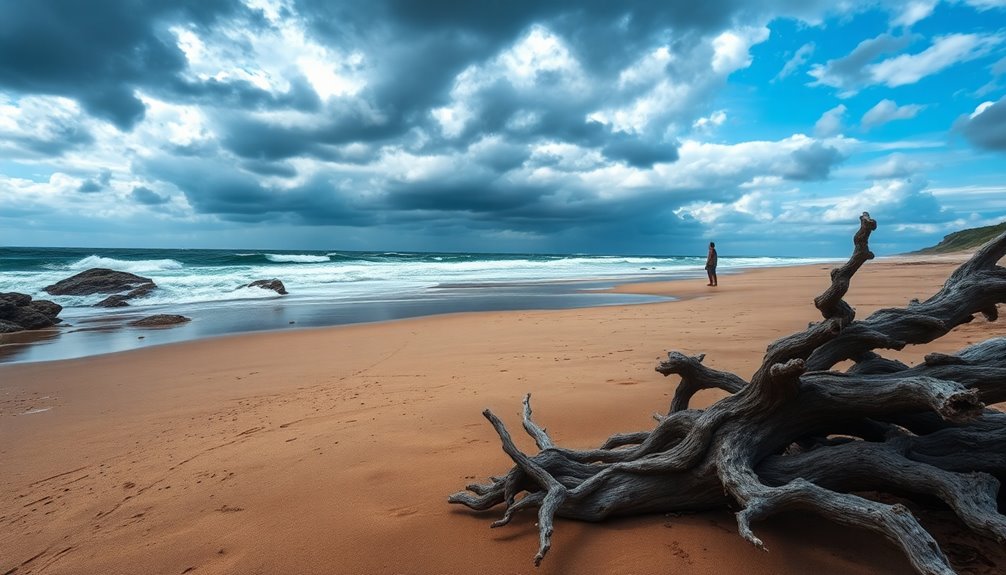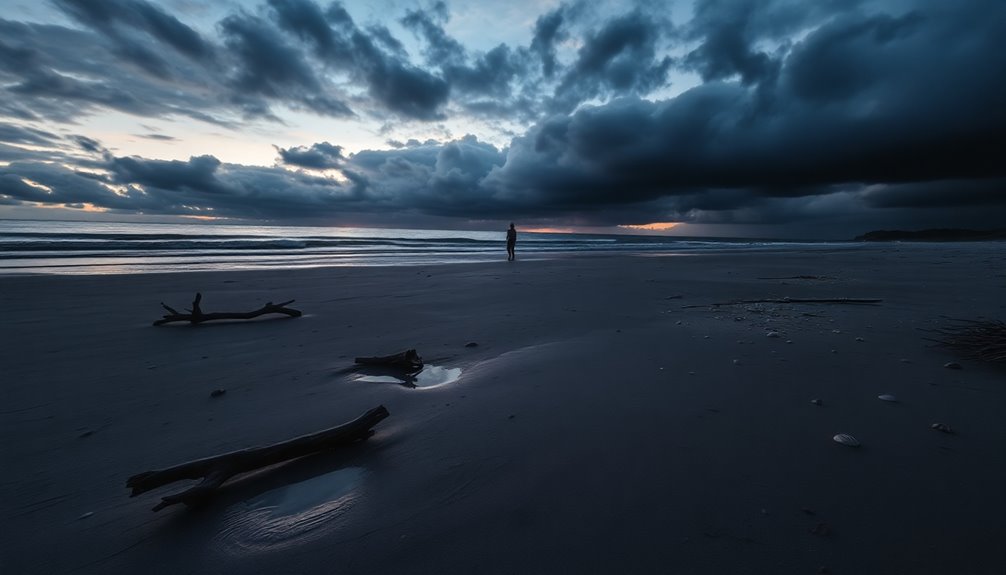*The Beach: A Haunting Exploration of Paradise Lost* invites you to explore how modern existential crises echo Milton's timeless themes of free will and redemption. As you navigate the beach, you'll uncover profound symbolism representing the divide between paradise and loss. The vivid imagery captures the transient beauty of life, mirroring Adam and Eve's fleeting joy. With Milton's innovative language as a backdrop, the book reflects on moral complexities and the struggle against temptation. This haunting narrative challenges you to confront your beliefs and the nature of grace. Keep going if you're curious about the deeper connections that unfold.
The Interplay of Themes

How does the interplay of themes in *Paradise Lost* shape our understanding of human nature? The poem intricately weaves free will and disobedience into the fabric of the human experience, illustrating that your choices greatly affect your destiny.
Milton presents a cosmic battle between good and evil, with Satan's rebellion serving as a backdrop to humanity's struggle. This celestial conflict mirrors your inner turmoil as you navigate temptation and the consequences of your decisions. The narrative reflects how the absence of moral constraints can lead to a descent into chaos, similar to the themes explored in Lord of the Flies(#). In this context, the exploration of social class and ambition in *Great Expectations* further emphasizes the impact of personal choices on one's life trajectory.
As Adam and Eve grapple with their newfound knowledge, the narrative reveals that enlightenment often brings guilt and remorse. Their disobedience distorts their original likeness, highlighting the fragility of human nature when faced with temptation.
Yet, within this chaos lies the potential for redemption. The poem emphasizes that grace is essential, as the law may expose sin but can't eradicate it. In a similar vein, Dickens' exploration of resilience and personal growth in *David Copperfield* further underscores the complexities of human experience in the face of adversity.
Ultimately, *Paradise Lost* invites you to reflect on the complexities of your own existence. It challenges you to contemplate how your choices shape your identity and your relationship with the divine, encouraging a deeper understanding of both the weight of disobedience and the hope of redemption in a fallen world.
Symbolism of the Beach
The beach serves as a powerful symbol in *Paradise Lost*, representing the boundary between the idyllic paradise of Eden and the chaos of the fallen world. As you explore this haunting landscape, you'll feel the weight of Adam and Eve's choices echoing in the sand.
The beach embodies the transient nature of beauty and innocence, reminding you of the fleeting joy they experienced before their sin. Resilience and hope serve as guiding beacons, illustrating the depth of their emotional turmoil as they navigate their new reality. The emotional struggles faced by Adam and Eve can be likened to the generational poverty in *A Tree Grows in Brooklyn*, illustrating how choices shape one's future.
Consider these poignant reflections:
- The vast ocean mirrors the unknown consequences of their free will.
- The shifting tides illustrate the continuous struggle between good and evil.
- The haunting quality evokes a deep sense of loss and longing.
- The shoreline symbolizes the separation from divine grace, a reminder of what was lost.
In this way, the beach isn't just a physical location but a powerful metaphor for the emotional and moral dilemmas faced by Adam and Eve.
As you walk along the shoreline of *Paradise Lost*, you're invited to contemplate the profound complexities of choice, the pain of separation, and the eternal battle between the light of paradise and the darkness of fallen existence. Additionally, the resilience found in survival stories can inspire reflection on personal choices and their consequences, much like those faced by Adam and Eve.
Milton's Poetic Techniques

As you reflect on the rich symbolism of the beach in *Paradise Lost*, it's also important to appreciate Milton's masterful poetic techniques that bring the narrative to life.
His groundbreaking use of blank verse, the first of its kind in English, allows for a natural flow that enhances the poem's dramatic qualities. Through vivid imagery, like Satan's harrowing journey through Hell, Milton immerses you in the emotional depths of his themes, evoking strong sensory experiences. The use of magical realism in literature, reflected in Milton's vivid depictions, further enriches the reader's experience of the narrative.
Milton skillfully manipulates pacing and structure, employing pauses that heighten anticipation and emotional investment. This technique draws you deeper into the struggle between good and evil, making the conflict resonate profoundly. The interplay of gender roles in the poem mirrors societal expectations, adding another layer to the complex narrative.
His language, blending common and uncommon English words, maintains accessibility while contributing to the poem's grandness and eloquence. Furthermore, Milton's exploration of social class in his characters reflects the rigid structures of his time, enhancing the thematic richness of the work.
Reflections on Redemption
Exploring the theme of redemption in *Paradise Lost* reveals a rich tapestry woven with profound theological insights. Milton presents redemption not just as a possibility but as a necessity, emphasizing that grace is essential for salvation. The story of the Fall illustrates that while sin leads to despair, it also opens the door to divine mercy.
Consider these reflections on redemption:
- Free Will: You're reminded that choices matter; Adam and Eve's fall was a consequence of their free will.
- Grace: Redemption isn't earned; it's a gift that highlights God's overflowing grace. This notion parallels the idea of human resilience, as seen in stories like Louis Zamperini's journey in *Unbroken*. In the face of adversity, characters like Liesel Meminger demonstrate how resilience can foster hope and strength.
- Sin and Death: The narrative confronts the harsh reality of sin, yet it also promises hope for restoration.
- Dynamic Process: Redemption isn't a one-time event; it's an ongoing struggle against temptation and moral choices.
Milton's portrayal of sin's consequences enhances the narrative's gravity while underscoring the hope of eventual restoration. Additionally, the exploration of systemic oppression in Coates' work emphasizes that understanding the complexities of sin and redemption can enrich our comprehension of grace and mercy in our lives.
As you engage with these themes, you're invited to reflect on your own journey, contemplating how grace and divine mercy can guide you through the complexities of life, making redemption a compelling, personal quest.
Lasting Influence on Literature

With its profound themes and innovative language, John Milton's *Paradise Lost* has left an indelible mark on literature, influencing generations of writers and thinkers. This great work investigates complex concepts like free will and redemption, making it resonate with readers and writers alike. The exploration of resilience and personal growth further emphasizes the timeless nature of Milton's storytelling. The themes of ambition and rivalry in Milton's work mirror those found in contemporary narratives, showcasing how these elements shape character destinies.
You can see its lasting relevance in the works of authors like C.S. Lewis and Philip Pullman, who weave themes of temptation and the fall into their narratives. Milton's exploration of the rebel angels and the nature of good and evil not only captivates but also prompts modern adaptations, further affirming its impact.
In fact, Samuel Johnson placed *Paradise Lost* just behind Homer in literary achievement, showcasing its esteemed status in the Western canon. Moreover, Milton's contribution to the English language is remarkable; he coined more new words than both Chaucer and Shakespeare.
This linguistic creativity adds another layer to his influence, inspiring writers to expand their own vocabularies. Additionally, the themes of redemption and forgiveness presented in works like *Unfailing Love* and *A Love Like Ours* echo the moral complexities found in Milton's narrative. If you're looking to understand the depth of literary tradition, I highly recommend exploring *Milton's Paradise Lost*, as it truly exemplifies the power of storytelling through its rich narrative and character development.
Conclusion
In the end, "The Beach" becomes a mirror reflecting our own lost paradises, urging you to confront the shadows of desire and the cost of dreams. Just like the tide that ebbs and flows, your journey through its pages reveals the delicate balance between hope and despair. As you step away from this haunting tale, you carry with you a grain of sand—a reminder that even paradise can be a fleeting illusion, forever etched in your heart.



